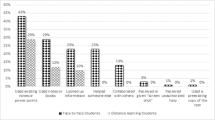Abstract
This is a response to the Ask the Experts question regarding whether students in behavior analysis programs should respond to misrepresentations made by others about the field.
Similar content being viewed by others
Avoid common mistakes on your manuscript.
Ask the Experts
Question: How can new students defend behavior analysis from misunderstandings?
Answer:
I think that at any point in your career, whether you are a student or seasoned professional, when you come across misrepresentations or inaccurate statements about our field, you find a way to address it. But as with all things, context matters. For example, when an individual misspeaks about our field in front of others, you may be able to address it in the moment in a non-adversarial way and sway the opinions of others, both by making clarifying comments and by providing information or resources to follow up your point. A different situation, which concerns me more, arises when individuals misrepresent our field in the media. I look at this as an opportunity to make a professional response, perhaps with the assistance of colleagues and professors. For example, the Time magazine website recently posted an article entitled “Time outs are hurting your child.” The article described time-out as an inappropriate form of discipline that could harm children. The Practice Board of ABAI wrote a clear, nonthreatening response that provided (1) a rationale for why time-out can work and (2) resources for readers. Although the response was never published, the authors of the original article wrote a “retraction” of sorts and refined their statements noting that sometimes, time-out is used inappropriately, but, if used correctly, could be an effective form of discipline. So, it was sort of a “win.”
While addressing misconceptions is important, it is critical to do so in a professional, non-adversarial way. Graduate students are often the most ardent supporters of our field, but it is important that their heartfelt responses do not come across as argumentative or you will lose your audience (and have no hope of behavior change). Because when it comes right down to it, is not this simply another example of changing the behavior of those around us?
Author information
Authors and Affiliations
Corresponding author
Rights and permissions
About this article
Cite this article
Zarcone, J. Ask the Experts: Answer to: How Can New Students Defend Behavior Analysis from Misunderstandings?. Behav Analysis Practice 8, 109 (2015). https://doi.org/10.1007/s40617-014-0037-9
Published:
Issue Date:
DOI: https://doi.org/10.1007/s40617-014-0037-9




